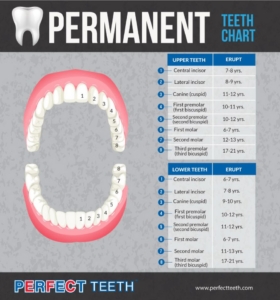Permanent Teeth, what you should know.
Here’s what you need to know about permanent teeth.
When do primary teeth come in?
Typically we see babies start teething around 6 months old. This is there first set of teeth called “primary” teeth, though often referred to as baby teeth. There are 20 primary teeth that continue to erupt until age 2-3. Besides helping kids chew their food, primary teeth have the important job of holding place in the jaw for their 32 permanent teeth.
When do permanent teeth come in?
Kids usually start losing their primary teeth around the time that school starts. As shown on the chart the permanent teeth erupt in the same order that their primary teeth did. This often means that th e first baby teeth to erupt are also the first to fall out and be replaced by adult teeth. Of course there are special cases in which this doesn’t apply. For example, when there is poor dental hygiene, trauma to the primary tooth, or a medical condition. By the age of 12-13 most kids have all of their permanent teeth.
e first baby teeth to erupt are also the first to fall out and be replaced by adult teeth. Of course there are special cases in which this doesn’t apply. For example, when there is poor dental hygiene, trauma to the primary tooth, or a medical condition. By the age of 12-13 most kids have all of their permanent teeth.
If your child has a loose tooth, see our blog about pulling baby teeth!
Why fix baby teeth if they’re just going to fall out?
We hear this question quite often. When a child has a cavity in their baby tooth it can be tempting to just leave it until it falls out. Untreated cavities in baby teeth can impact roots and spread bacteria to their permanent teeth potentially causing more cavities or gum disease. Additionally, they can become quite painful.
Hopefully these tidbits help you prepare for your child’s changing mouth. As always, please call us if you have any questions!
